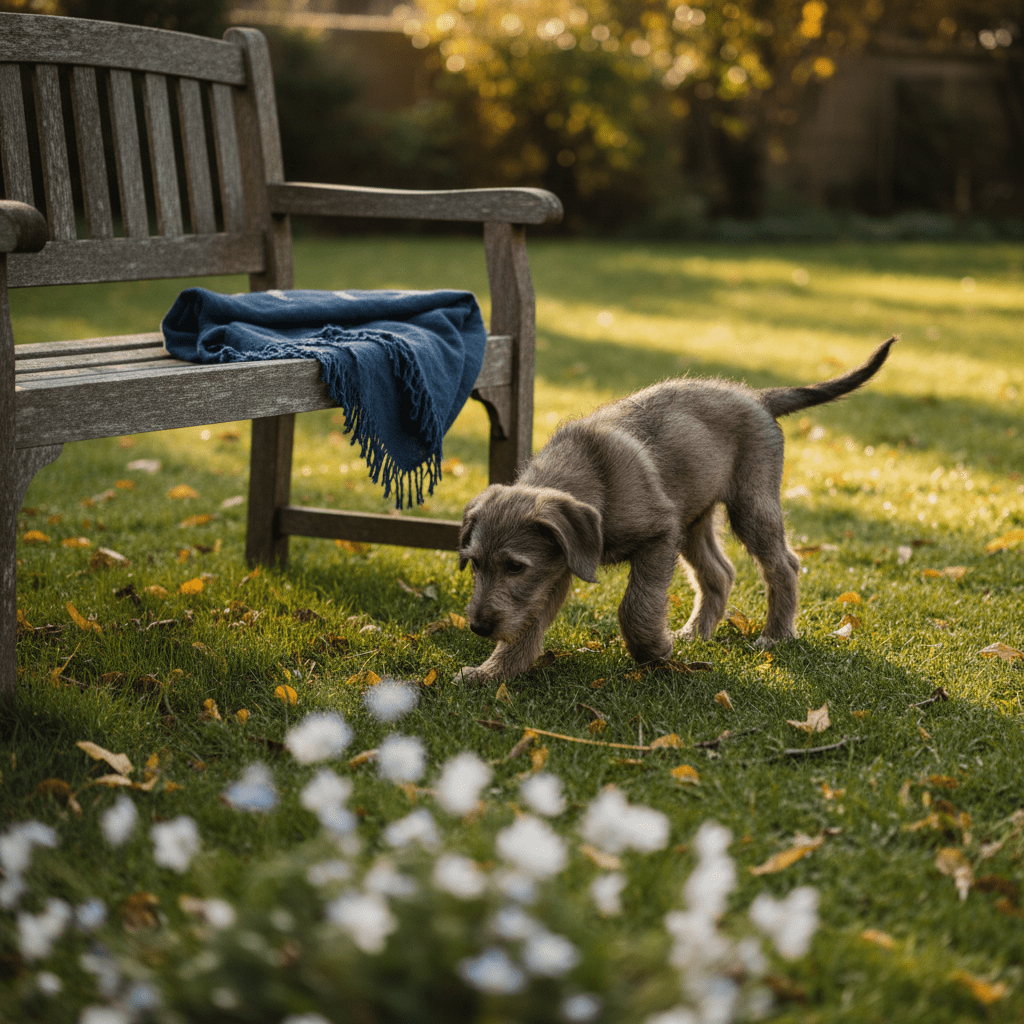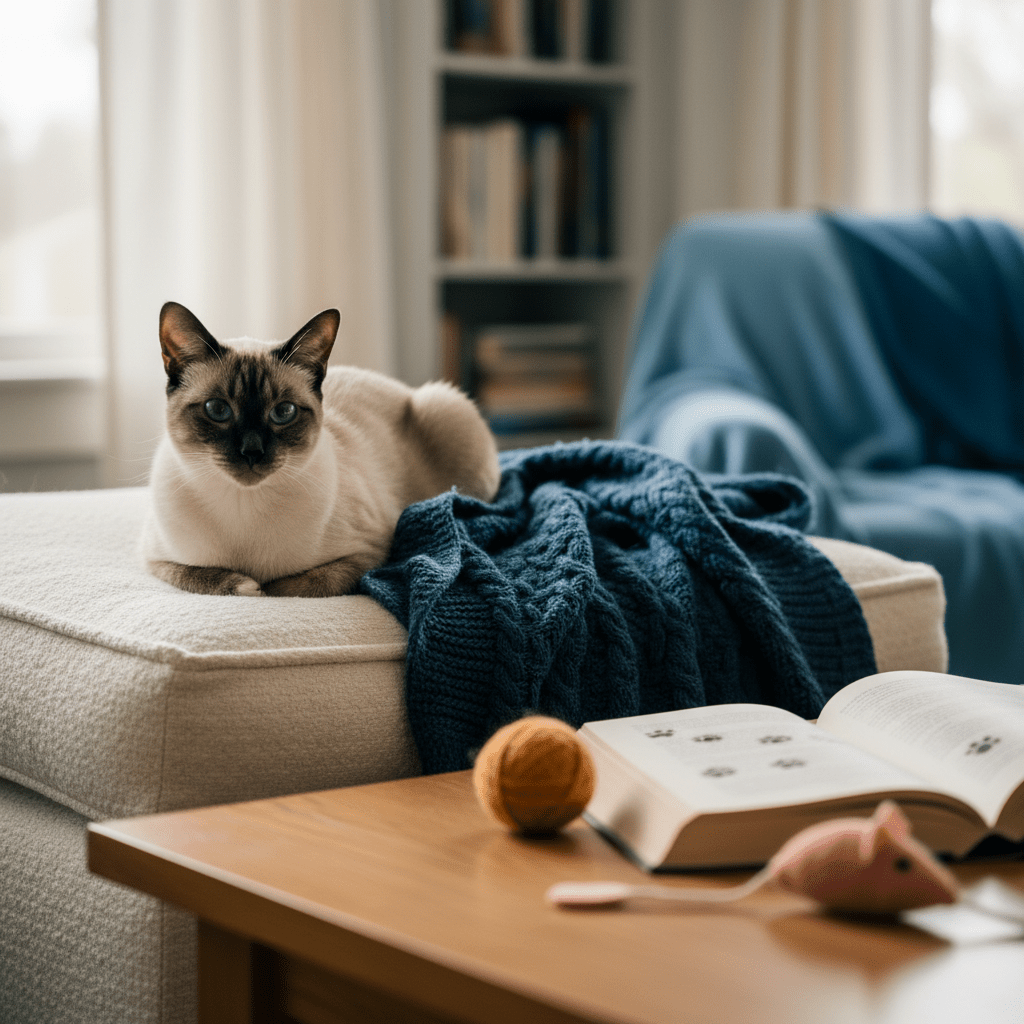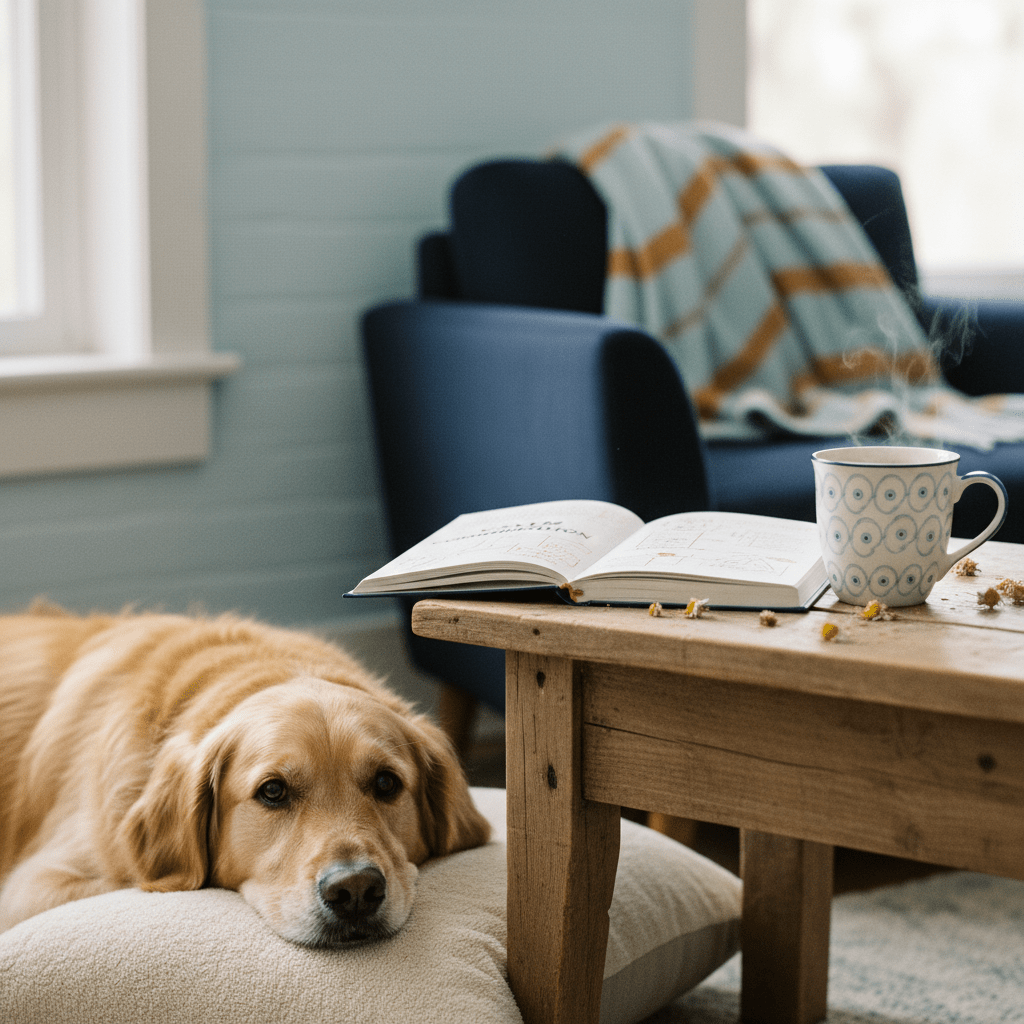Key Takeaways
- A deerhound puppy is a fast-growing and affectionate giant breed dog.
- Deerhounds have been raised for centuries for companionship and outdoor adventure.
- This breed is best suited for families prepared to provide gentle and natural care.
- Consistent training is essential for raising a well-behaved deerhound puppy.
- Building a real connection with the pet is important for their well-being.
Table of Contents
- Meet the Deerhound Puppy: History, Size & What Makes Them Special
- Deerhound Puppy Temperament: What to Expect from Your New Best Friend
- Is a Deerhound Puppy Right for You? Lifestyle, Space & Family Fit
- Finding and Choosing a Healthy Deerhound Puppy: Breeder, Rescue & First Signs
- Bringing Home Your Deerhound Puppy: First Weeks & Smooth Transitions
- Feeding Your Deerhound Puppy: Nutrition, Timing & Natural Support
- Socialization and Training: Growing a Confident, Well-Mannered Deerhound
- Grooming & General Care: Keeping Your Deerhound Puppy Clean, Comfortable & Cared For
- Health Considerations: Growth, Vet Care & Natural Support for Deerhound Puppies
- Solving Common Deerhound Puppy Problems, Real-Life Solutions from Pet Parents
- Living With a Deerhound Puppy: BestLife4Pets Community Wisdom
- Celebrate the Journey: Next Steps in Raising Your Deerhound Puppy Naturally
Deerhound Puppy – Raising a Gentle Giant, Naturally
Quick Answer: A deerhound puppy is a fast-growing, affectionate giant breed dog, raised for centuries for companionship and outdoor adventure, best suited to families ready for gentle, natural care, consistent training, and real connection with their pet.
These Scottish sighthounds transform from playful, energetic puppies into serene "couch hounds" who'll steal your heart and your favorite chair. With proper natural support and patient guidance, your deerhound puppy will grow into a loyal companion who balances bursts of speed with hours of peaceful snuggling.
To help your deerhound puppy thrive, many families rely on Walk-Easy® Hip & Joint Pain Relief during rapid growth phases, supporting comfort and healthy development for these gentle giants.
Meet the Deerhound Puppy: History, Size & What Makes Them Special
Scottish Deerhounds earned their place as the "Royal Dog of Scotland," bred for centuries to hunt alongside nobility while maintaining gentle temperaments at home. These aren't just hunting dogs, they're companions with centuries of selective breeding for both athletic ability and sweet nature. For more on the breed's fascinating background, see this Scottish Deerhound overview.
Size expectations matter when planning for your deerhound puppy. Males reach 30-32 inches and 85-110 pounds, while females stand 28+ inches at 75-95 pounds. Puppies grow rapidly, often gaining 3-5 pounds weekly during growth spurts, reaching near-adult height by 12-15 months.
Growth Reality Check: Your 8-week puppy weighing 15 pounds will likely triple in size by 6 months. Plan your space, budget, and energy accordingly.
Their lifespan of 8-11 years includes an extended "puppyhood" lasting nearly two years behaviorally. That shaggy coat, those soulful eyes, and their signature gentle-yet-powerful presence make them unmistakable. Unlike many giant breeds, Deerhounds maintain playful spirits well into their senior years, though they master the art of selective energy, saving bursts for what truly matters.
Deerhound Puppy Temperament: What to Expect from Your New Best Friend

Deerhound puppies embody contradictions: gentle giants who'll chase a butterfly with fierce determination, then curl up for three-hour naps. Their core temperament centers on loyalty and sweetness, making them excellent with respectful children who understand "gentle touches only."
Puppy versus adult behavior shows dramatic shifts. Young Deerhounds are exploratory adventurers, investigating every corner with boundless curiosity. By age two, they transform into peaceful "couch hounds" who prefer comfort over chaos, though they'll always answer the call for outdoor adventures.
Their prey drive creates the classic "squirrel alarm" scenario, your calm puppy suddenly becomes a focused hunter mid-walk. This instinct never fully disappears, making secure fencing and patient recall training essential. However, the same pup who bolted after a rabbit will return to snuggle contentedly with the family cat.
Sensitivity defines their training needs. Harsh corrections cause Deerhounds to "shut down," becoming withdrawn and anxious. They respond beautifully to positive reinforcement, gentle guidance, and consistent routines. Think encouragement over enforcement.
Multi-pet households often thrive with Deerhounds. Bailey, a Best Life 4 Pets family favorite, grew up with a tabby cat who taught him that indoor zoomies have house rules. Their natural gentleness, combined with proper socialization, creates harmonious pack dynamics when introduced thoughtfully.
Is a Deerhound Puppy Right for You? Lifestyle, Space & Family Fit
Deerhound puppies thrive with active, patient, outdoorsy families who understand that "exercise" means more than neighborhood walks. These dogs need secure fenced yards, minimum 6 feet high, and access to safe spaces where they can stretch their legs in short bursts.
Space requirements extend beyond square footage to security. Deerhounds can clear impressive heights when motivated by prey, and their gentle nature makes them poor guard dogs but excellent escape artists. Best Life 4 Pets families often create "deerhound zones" with double-gated entries and sight barriers to minimize temptation.
| Daily Needs | Deerhound Puppy | Adult Deerhound |
|---|---|---|
| Exercise Time | 30-45 minutes (multiple short sessions) | 45-60 minutes (flexible timing) |
| Mental Stimulation | High (exploring, training) | Moderate (routine activities) |
| Supervision Level | Constant during awake hours | Minimal with secure environment |
Time and energy investments peak during puppyhood. A typical day includes multiple potty breaks, training sessions, supervised play, grooming, and plenty of rest periods. This isn't a "leave them bored all day" breed, understimulated Deerhounds develop destructive habits quickly. Frequent travelers or households where everyone works long hours should consider adult rescue dogs instead.
Finding and Choosing a Healthy Deerhound Puppy: Breeder, Rescue & First Signs
Responsible breeders prioritize health screenings for heart conditions, genetic issues, and proper socialization from birth. Ask these three critical questions: What health testing has been done on the parents? Can I meet the puppy's mother? What ongoing support do you provide new families? Reputable breeders welcome these conversations and provide documentation.
Rescue organizations often have deerhound puppies or young adults seeking second chances. These pups may need extra patience during adjustment, but rescue staff typically know each dog's personality and can match you with the right fit. Many rescued deerhounds become incredibly loyal companions, grateful for their new start.
During your visit, watch for healthy puppy signs: bright, curious eyes, clean ears without odor, playful interaction with littermates, and appropriate weight for their age. A healthy deerhound puppy should approach you with interest, not cower or seem overly timid. Their coat should feel soft, and they should move without limping or hesitation.
Red flags include persistent lethargy, fearful behavior that doesn't improve with gentle coaxing, visible ribs or bloated belly, and any signs of respiratory distress. Trust your instincts, if something feels off, it's worth investigating further or considering other options.
Bringing Home Your Deerhound Puppy: First Weeks & Smooth Transitions

Before your deerhound puppy arrives, secure your yard with fencing at least six feet high, these natural athletes can clear lower barriers when excited. Remove toxic plants, secure garbage cans, and create a designated puppy zone with appropriate-sized toys. Large breed puppies need sturdy chew items that won't break into dangerous pieces. For inspiration, check out these best puppy dog toys to keep your new companion entertained and safe.
The first 24 hours set the tone for everything that follows. Bring a familiar blanket from the breeder to provide comforting scents during this major transition. Keep introductions calm and gradual, excited children and curious pets can overwhelm a nervous puppy. Establish a quiet space where your new family member can retreat when feeling overstimulated.
Create a consistent routine immediately. Deerhound puppies thrive on predictability, regular meal times, potty breaks every two hours, and scheduled rest periods. These gentle giants need 18-20 hours of sleep daily during their first few months, so don't be alarmed by frequent napping.
Expect adjustment challenges like whining at night, accidents indoors, and testing boundaries. Best Life 4 Pets families often find that gentle, natural Pet Relax Dog Calming Anxiety Relief helps ease transition stress without harsh medications. Most puppies settle into their new routine within a week when approached with patience and consistency.
Feeding Your Deerhound Puppy: Nutrition, Timing & Natural Support
| Age | Daily Meals | Portion Size | Key Focus |
|---|---|---|---|
| 8-12 weeks | 4 meals | 1-2 cups total | Steady growth |
| 3-6 months | 3 meals | 3-5 cups total | Controlled development |
| 6-12 months | 2 meals | 6-8 cups total | Joint protection |
| 12+ months | 2 meals | 8-12 cups total | Adult maintenance |
Large breed puppies like deerhounds require careful nutrition management to prevent rapid growth that stresses developing joints. Choose foods specifically formulated for large breed puppies, with controlled calcium and phosphorus ratios. Avoid the temptation to overfeed, a slightly lean puppy develops stronger bones than an overweight one. For more tips on choosing the right food, see our guide on puppy and food.
Natural supplementation supports healthy development without overwhelming young systems. Many Best Life 4 Pets families use gentle homeopathic pellets to ease digestive transitions when switching foods, support teething discomfort, and maintain overall wellness during growth spurts. These tasteless pellets integrate seamlessly into daily routines. For additional digestive support, consider the Dog De-Wormer Broad Spectrum to help your puppy through sensitive stages.
Monitor eating habits closely during the first weeks. Some deerhound puppies are enthusiastic eaters, while others seem picky. Hand-feeding occasionally builds positive associations with mealtime and strengthens your bond. Always provide fresh water, and watch for signs of bloat, a serious condition in deep-chested breeds that requires immediate veterinary attention.
Socialization and Training: Growing a Confident, Well-Mannered Deerhound
The critical socialization window for deerhound puppies closes around 16 weeks, making early exposure essential. Focus on positive experiences with various people, friendly dogs, household sounds, and different environments. A well-socialized deerhound becomes a confident, adaptable adult who handles new situations with grace rather than fear.
These sensitive souls respond beautifully to gentle, positive training methods but shut down completely with harsh corrections or raised voices. Use treats, praise, and patience to teach basic commands like sit, stay, and come. House training typically takes 4-6 months with consistent outdoor breaks every two hours and immediate praise for outdoor success. If you're considering crate training, see our tips on crate training puppy for a smooth experience.
Managing prey drive requires special attention in sighthound breeds. Start recall training in secure, fenced areas before attempting off-leash freedom. Many deerhound owners find that their dogs have selective hearing when squirrels appear, so maintaining realistic expectations helps prevent frustration.
Mental enrichment prevents destructive behaviors born from boredom. Puzzle feeders, rotating toys, and training sessions keep intelligent deerhound puppies engaged. BestLife4Pets families report success with short, frequent training sessions rather than marathon attempts that overwhelm sensitive temperaments.
Grooming & General Care: Keeping Your Deerhound Puppy Clean, Comfortable & Cared For

A deerhound puppy's wiry, weatherproof coat requires surprisingly minimal maintenance compared to many breeds. Gentle brushing 2-3 times weekly prevents matting and removes debris from outdoor adventures. Use a slicker brush followed by a metal comb to work through any tangles, starting from the tips and working toward the skin. For more grooming tips, visit our article on grooming a puppy.
Bathing should remain minimal, every 6-8 weeks or when genuinely dirty. Over-bathing strips natural oils that protect their skin and coat. Between baths, spot-clean muddy paws or bellies with a damp cloth. Nail trims every 2-4 weeks prevent painful splitting, especially important for fast-growing puppies whose nails can quickly become uncomfortable.
Regular ear checks and gentle teeth cleaning establish positive grooming habits early. Make each session a bonding experience with treats and patience. Many deerhound families report success turning brushing time into cuddle sessions, which helps these sensitive pups associate handling with affection rather than stress.
Community Tip: Best Life 4 Pets families recommend starting nail handling from day one, just touching and holding paws during calm moments, even without clipping, builds tolerance for future grooming sessions.
Health Considerations: Growth, Vet Care & Natural Support for Deerhound Puppies
Deerhound puppies face unique health considerations due to their rapid growth and giant breed status. Joint development requires careful monitoring, sudden limping after play or reluctance to move may signal growing pains or overexertion. Bloat poses a serious risk, so feeding smaller, frequent meals and avoiding exercise immediately after eating helps prevent this emergency condition.
These gentle giants show sensitivity to anesthesia, making it crucial to work with veterinarians experienced with sighthounds. Standard vaccination schedules apply, but stress-free vet visits matter more for anxious deerhound puppies. Bring familiar blankets and allow extra time for gradual introductions to new environments.
Heart conditions and genetic issues can occur, though reputable breeders screen for common hereditary problems. Watch for unusual fatigue, difficulty breathing, or changes in appetite. Growth spurts may cause temporary coordination issues, perfectly normal as long as your puppy remains playful and alert. For more detailed veterinary information, see this veterinary guide to deerhounds.
Natural support through homeopathic remedies helps ease minor discomforts during development. Best Life 4 Pets formulas support healthy digestion, joint comfort, and emotional balance without harsh side effects. Luna, a deerhound puppy in Ontario, bounced back from teething discomfort and digestive upset when her family combined gentle veterinary care with consistent natural support and patient understanding. If your puppy struggles with allergies or immune issues, the Dog Allergy Relief & Immune Support can be a gentle addition to their routine.
Solving Common Deerhound Puppy Problems, Real-Life Solutions from Pet Parents
Destructive chewing often stems from boredom or teething discomfort in deerhound puppies. Rotate chew toys weekly to maintain novelty, offer frozen carrots or specialized teething toys, and ensure adequate mental stimulation through puzzle feeders. Redirect unwanted chewing immediately to appropriate items rather than simply saying "no."
Managing explosive energy requires strategic planning. Schedule high-energy play sessions before meal times, create safe spaces for indoor zoomies during bad weather, and balance physical activity with mental challenges. A tired deerhound puppy is typically a well-behaved deerhound puppy, but avoid overexertion that could damage developing joints.
Socialization challenges respond well to gradual, positive exposure. Shy puppies benefit from calm, patient introductions to new experiences. Best Life 4 Pets Peaceful Paws Dog Anxiety & Aggression Remedy helps anxious pups approach new situations with confidence while maintaining their naturally gentle temperament.
Hunting instincts require management rather than elimination. Teach solid recall in secure areas, use long training leads for gradual freedom, and never punish natural behaviors. Instead, redirect prey drive into appropriate games like fetch or hide-and-seek. Separation anxiety prevention starts early, practice brief departures with special toys or treats that only appear when you leave.
Living With a Deerhound Puppy: BestLife4Pets Community Wisdom

Real families share heartwarming stories of life with deerhound puppies. Daisy's family in Michigan credits consistent routines and natural remedies for helping their sensitive pup adjust to family life. "She went from hiding behind furniture to greeting visitors at the door, patience and the right support made all the difference," they report.
Community favorites include Best Life 4 Pets pellets for digestive support during food transitions, calming formulas for thunderstorms, and joint support during growth spurts. Families appreciate having gentle, effective options that work alongside veterinary care without harsh side effects.
The Best Life 4 Pets community welcomes your deerhound puppy stories, questions, and discoveries. Whether you're celebrating first successful recalls or navigating teething challenges, sharing experiences helps every family raise happier, healthier pets naturally. Connect with Viktoria and fellow pet parents who understand the unique joys of gentle giant ownership. For more helpful advice, browse our pet blog tips collection.
Celebrate the Journey: Next Steps in Raising Your Deerhound Puppy Naturally
The transformation from bouncing deerhound puppy to serene adult companion creates lifelong memories filled with muddy paws, stolen socks, and endless affection. Each growth spurt, training breakthrough, and quiet cuddle builds an unbreakable bond between you and your gentle giant.
Best Life 4 Pets supports every stage of your deerhound puppy's development with gentle, effective remedies that complement your loving care. From teething relief to joint support during growth spurts, natural solutions help your puppy thrive while maintaining their sweet, sensitive nature.
Remember that raising a deerhound puppy is a marathon, not a sprint. Embrace the journey with patience, celebrate small victories, and trust in the natural healing power of homeopathy combined with your dedication. Your gentle giant is worth every moment of this incredible adventure together.
Frequently Asked Questions
What are the key considerations for training and socializing a Deerhound puppy to ensure they grow into well-mannered adults?
Consistent, gentle training is essential for Deerhound puppies to develop good manners and confidence. Early socialization with people, other pets, and various environments helps them grow into calm, well-adjusted adults who enjoy both playtime and quiet companionship.
How does the rapid growth of a Deerhound puppy affect their nutritional and health care needs during the first year?
Because Deerhound puppies grow quickly, they need balanced nutrition that supports healthy bone and joint development. Regular vet check-ins and natural support like gentle hip and joint remedies can help ease growing pains and promote comfortable, steady growth.
Is a Deerhound puppy suitable for families with children, and what kind of environment is best for this breed?
Deerhounds can be wonderful family dogs, especially in homes where children are taught to interact gently. They thrive in spacious environments with opportunities for outdoor exercise and calm, loving attention to meet their need for both activity and relaxation.
What natural care and support options are recommended to promote healthy development and comfort in Deerhound puppies?
Natural care for Deerhound puppies includes balanced nutrition, consistent exercise, and gentle homeopathic support to ease discomfort during growth phases. Products like Walk-Easy® Hip & Joint Pain Relief can support comfort and healthy development without harsh chemicals.



